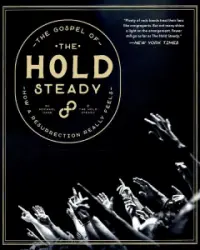It seems that to be a fan of The Hold Steady, or at least a guest writer in the quite culty and obsessively—both traits required to be a fan of the band in the first place—enjoyable coffee table book/oral history, The Gospel of The Hold Steady, you have to one, know how you discovered The Hold Steady in the first place and two, know where you saw them first.
I can relate to that.
There are bonus points if it was somewhere in Brooklyn near the early part of the century.
I can’t relate to that.
The band and their fans by and large—especially those invited to write the interstitial entries that fall between the chronological passages of oral history comprising the book’s framework—also talk about being part of what The Hold Steady considers the Unified Scene.
That’s more tricky for me.
So, let’s start with what I can relate to and isn’t tricky for me.
My first exposure to The Hold Steady was not a live show, or the music itself. I read a blurb in The New Yorker about them, which I loved. It was something about the literary nature of the writing and something about rock and roll and bars, accompanied by a photo of Craig Finn in a suit. This would have been around 2006—post Separation Sunday, their sophomore album, and pre-Boys and Girls in America, their massive third album—and it was enough for me to become interested in whatever they were up to. I went to the Tower Records downstairs from my office the next day, bought the CD of Separation Sunday, brought it back up to my office, and let her rip.
And it really ripped.
Songs about drugs and getting high, drinking, boys and girls and I don’t know what. Songs sang with passion and energy, and characters who reminded me just enough of the people I grew up with, or were at least adjacent to the people I knew, even if they all seemed a little younger than me and I was never quite like them—hanging out at festivals and in the streets strung out and just a little too sweaty.
Still, it was fun and full of energy—and I needed that energy.
It’s hard for me to recall exactly where my head was in 2006, but I know I had two small children, I went to work everyday, I wrote early every morning, and sometimes late at night, falling asleep on my keyboard, and I had yet to publish a book or get much of a sense of whether writing would lead to anything at all.
I also know that Separation Sunday was part of a series of albums that made my sometimes dreary afternoons pop—there was a live album from AVAIL, The Seeger Sessions from Springsteen, a much belated deep dive into Exile in Guyville, Ike Reilly—someone else I read about first, in this case a blurb in the Chicago Tribune—and his fantastic album We Belong to the Staggering Evening—The Gray Album and Yankee Foxtrot Hotel, both bootlegs, then The Black Album, and Late Registration, too.
That’s how I found music then, with little kids. I read about it, I bought CDs without ever having heard the music—I rarely went to shows—and in a way music saved me, my sanity anyway and my equilibrium.
I did finally see The Hold Steady though, at Metro here in Chicago in 2007, and Boys and Girls in America had dropped by then. I had also probably played the CD nearly five million times at that point. I went to the show by myself, I didn’t know anyone else who cared here, and outside of dragging a friend to a later show at House of Blues and my wife one time to Thalia Hall, I never really found anyone locally to go with.
I didn’t really try either, and I wasn’t even social when I went to their shows. I’m no purist—though I do enjoy doing things alone—but the community thing was not what I sought—which is quite the antithesis of The Hold Steady vibe. What I sought was escape, joy, and songs I could sing with and to.
The Hold Steady was happy to be that.
In The Gospel of The Hold Steady, the band talks about telling Minneapolis stories and that’s what their best songs always felt like to me—short stories, interconnected, with callbacks, world building, recurring characters, as well as similar to other art I loved and love—television shows such as Atlanta or Better Things; PT Anderson movies.
The Hold Steady were doing something like I was trying to do—create something literate, fun, out there, slightly surreal and with a touch of magical realism.
That and creating a sense of joy and connection.
I never tried to figure it all out though, what the stories meant or why they wrote and sang them. That’s something I rarely do. I’m not interested in backstories or origin stories, timelines or timeframes, infighting or failure.
I’m interested in the product.
That said, it felt to me at the time like The Hold Steady consciously went bigger after Separation Sunday, looking for bangers and arena ready songs, which they certainly did with Boys and Girls in America, and possibly Stay Positive as well. Something they discuss in the book. Which is to say it wasn’t my imagination that it was happening—it was.
Further, it seemed to me that Heaven is Whenever and Teeth Dreams were not as great as the earlier albums, and I didn’t read about them to confirm this, or ask anyone, it was my feeling—and to read The Gospel of The Hold Steady is to find out that the band agrees. It also felt like they disappeared for a while and as it turns out they did go on hiatus. I never confirmed that either, however the band discusses it here.
 I also learned that when The Hold Steady played at Riot Fest here in Chicago in 2016 to celebrate the 10th Anniversary of the release of Boys and Girls in America—which included the recent return of keyboardist Franz Nicolay—The Hold Steady thought they were back.
I also learned that when The Hold Steady played at Riot Fest here in Chicago in 2016 to celebrate the 10th Anniversary of the release of Boys and Girls in America—which included the recent return of keyboardist Franz Nicolay—The Hold Steady thought they were back.
I was there and it felt like that even if I didn’t realize they felt they had lost their way.
They came back to Chicago in 2017 to celebrate the 25th Anniversary of the Empty Bottle as well.
I saw them then, too.
Which is to say what?
It’s to say that I’ve gladly embraced the gospel of The Hold Steady for the last seventeen years even if I’ve never quite invested in knowing much more than the joy their music brings me.
Until now—until the publication of The Gospel of The Hold Steady.
Can a non-fan enjoy it?
Yes, because the pleasure The Hold Steady always brings is there on the pages in both their words and the photos—it’s palpable—and you feel like you’re part of something just by reading what’s in front of you. I would add that it’s those interstitial pieces which really brought it all home for me—particularly the piece by the author Isaac Fitzgerald titled “Always Meet Your Heroes.” In it he writes the following (page 48):
In those days, I had dreams of becoming an artist, though I rarely shared those dreams with anyone; sometimes I couldn’t even look at them myself. But the dreams were there. By the time of that first show at the Fillmore in 2008 I was washing dishes in the bar, but every day I wrote in my journal, trying to figure out how to tell my stories the way Craig Finn did in his songs.
And there it is.
Back then I wanted joy and escape—and mostly I wanted to write stories, especially like those Craig Finn wrote. I knew I wasn’t alone, not exactly—there were other writers in other places I knew who liked The Hold Steady as well—but none that I knew who felt like I did—still dreaming, still reaching, and still wondering when something was going to happen.
Apparently Isaac Fitzgerald felt the same way—and so as it turns I was part of a scene after all.
Get The Gospel of the Hold Steady at Bookshop or Amazon

About the author
Ben Tanzer is an Emmy-award winning coach, creative strategist, podcaster, writer, teacher and social worker who has been helping nonprofits, publishers, authors, small business and career changers tell their stories for 20 plus years. He is the author of the soon to be re-released short story collection Upstate and several award-winning books, including the science fiction novel Orphans and the essay collections Lost in Space: A Father's Journey There and Back Again and Be Cool - a memoir (sort of). He is also a lover of all things book, taco, Gin and street art.








